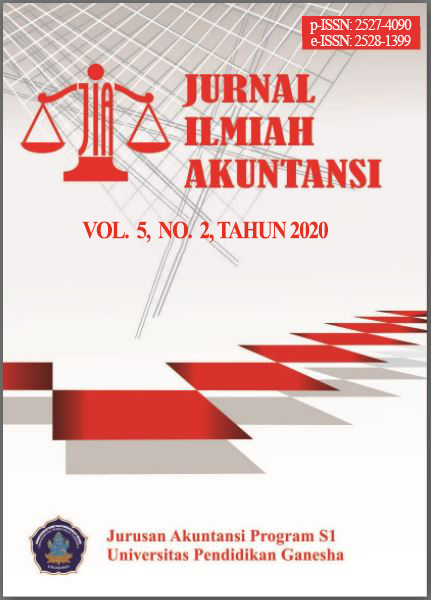Pengaruh Corporate Governance terhadap Pengungkapan Emisi Gas Rumah Kaca dengan Peran Audit Internal sebagai Pemoderasi
DOI:
https://doi.org/10.23887/jia.v5i2.28371Keywords:
corporate governance, greenhouse gas emission, internal audit, sustainability reportingAbstract
This study aims at internal audit reasons that moderate the effect of corporate governance on the level of disclosure of greenhouse gas (GHG) emissions. The sample selection technique was purposive sampling of 41 companies listed on the Indonesia Stock Exchange for the period 2015-2018 which made complete sustainable reports so that a total of 164 observations were made. Using multiple linear regression to test the hypothesis, the results of the study found that the proportion of female commissioners, board size and audit committee size significantly affects the disclosure of greenhouse gas emissions. Likewise, the role of internal audit significantly strengthens the influence between corporate governance and disclosure of greenhouse gas emissions. Other results indicate that the proportion of members of the independent board of commissioners and the frequency of audit committee meetings are not able to influence the disclosure of greenhouse gas emissions.
References
Allegrini, M., & Greco, G. (2013). Corporate Boards , Audit Committees and Voluntary Disclosure: Evidence from Italian Listed Companies. Journal of Management & Governance, 17, 187–216. https://doi.org/10.1007/s10997-011-9168-3
Appuhami, R., & Tashakor, S. (2016). The Impact of Audit Committee Characteristics on CSR Disclosure: An Analysis of Australian Firms. Australian Accounting Review, 27(1), 1–21. https://doi.org/10.1111/auar.12170
Beasley, M. S., Carcello, J. V, Hermanson, D. R., & Lapides, P. D. (2000). Fraudulent Financial Reporting : Consideration of Industry Traits and Corporate Governance Mechanisms. American Accounting Association. Accounting Horizons, 14(4), 441–454.
Chithambo, L., & Tauringana, V. (2017). Corporate governance and greenhouse gas disclosure : a mixed-methods approach. Corporate Governance, 17(4), 678–699. https://doi.org/10.1108/CG-10-2016-0202
Coetzee, P., & Lubbe, D. (2013). Improving the Efficiency and Effectiveness of Risk-Based Internal Audit Engagements. International Journal of Auditing, 18(2), 1–11.
Freeman, R. E. (1999). Divergent stakeholder theory. Academy of Management Review, 24(2), 233–236.
Galbreath, J. (2010). Corporate Governance Practices that Address Climate Change: an Exploratory Study. Business Strategy and the Environment, 19(5), 335–350.
Ganesan, Y., Hwa, Y. W., Jaafar, A. H., & Hashim, F. (2017). Corporate Governance and Sustainability Reporting Practices: The Moderating Role of Internal Audit Function. Global Busines and Management Research: An International Journal, 9(4), 159–179.
Harrison, J. S., & Freeman, R. E. (1999). Stakeholders , Social Responsibility , and Performance: Empirical Evidence and Theoretical Perspectives. Academy of Management Review, 42(5), 479–485.
Jaggi, B., Allini, A., Macchioni, R., & Zagaria, C. (2017). The Factors Motivating Voluntary Disclosure of Carbon Information : Evidence Based on Italian Listed Companies. Organization & Environment, 31(1), 178–202. https://doi.org/10.1177/1086026617705282
Kamel, H., Ishak, Z., Aziah, N., & Manaf, A. (2014). The Impact of Audit Committee Characteristics on Corporate Voluntary Disclosure. Procedia - Social and Behavioral Sciences, 164, 486–492. https://doi.org/10.1016/j.sbspro.2014.11.106
Krishnamurti, C., & Velayutham, E. (2017). The Influence of Board Committee Structures on Voluntary Disclosure of Greenhouse Gas Emissions: Australian Evidence. Pacific-Basin Finance Journal, 50, 65–81. https://doi.org/10.1016/j.pacfin.2017.09.003
Liao, L., Luo, L., & Tang, Q. (2015). Gender Diversity, Board Independence, Environmental Committee and Greenhouse Gas Disclosure. British Accounting Review, 47(4), 409–424. https://doi.org/10.1016/j.bar.2014.01.002
Mahmood, Z., Kouser, R., Ali, W., Ahmad, Z., & Salman, T. (2018). Does Corporate Governance Affect Sustainability Disclosure? A Mixed Methods Study. Sustainability, 10(2017), 1–20. https://doi.org/10.3390/su10010207
Matsumura, E. M., Vera-mu, S. C., Baber, B., Badertscher, B., Bonacchi, M., Burks, J., … Warfield, T. (2014). Firm-Value Effects of Carbon Emissions and Carbon Disclosures. American Accounting Association, 89(2), 695–724. https://doi.org/10.2308/accr-50629
Niza, T. C., & Ratmono, D. (2019). Pengaruh Karakteristik Corporate Governance terhadap Pengungkapan Emisi Gas Rumah Kaca. Diponegoro Journal of Accounting, 8(4), 1–10.
Peters, G. F., & Romi, A. M. (2012). The Effect of Corporate Governance on Voluntary Risk Disclosures: Evidence from Greenhouse Gas Emission Reporting. Business.Utah.Edu, pp. 1–58. Retrieved from https://www.yumpu.com/user/business.utah.edu
Peters, G. F., & Romi, A. M. (2014). Does the Voluntary Adoption of Corporate Governance Mechanisms Improve Environmental Risk Disclosures? Evidence from Greenhouse Gas Emission Accounting. Journal Business Ethics, 125, 637–666. https://doi.org/10.1007/s10551-013-1886-9
Soh, D. S. B., & Martinov-bennie, N. (2014). Internal Auditors ’ Perceptions of Their Role In Environmental, Social and Governance Assurance and Consulting. Managerial Auditing Journal, 30(1), 80–111. https://doi.org/10.1108/MAJ-08-2014-1075
Tauringana, V., & Chithambo, L. (2014). The Effect of DEFRA Guidance on Greenhouse Gas Disclosure. The British Accounting Review, 47(4), 425–444. https://doi.org/10.1016/j.bar.2014.07.002
Wasiuzzaman, S., & Wan Mohammad, W. M. (2019). Board Gender Diversity and Transparency of Environmental, Social and Governance Disclosure: Evidence From Malaysia. Managerial and Decision Economics, 41(1), 145–156. https://doi.org/10.1002/mde.3099
Widowati, H. (2020). Lima Tokoh Dunia Angkat Bicara soal Isu Perubahan Iklim di Davos. Retrieved from https://katadata.co.id/hariwidowati/berita/5e9a498f9f4ad/lima-tokoh-dunia-angkat-bicara-soal-isu-perubahan-iklim-di-davos



1.png)


